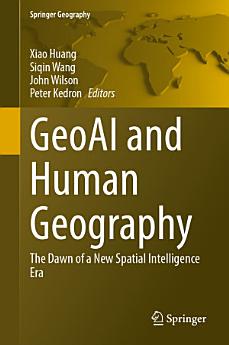GeoAI and Human Geography: The Dawn of a New Spatial Intelligence Era
About this ebook
About the author
Dr. Xiao Huang is an Assistant Professor in the Department of Environmental Sciences at Emory University. His research expertise encompasses human-environment interaction, computational social sciences, urban informatics, disaster mapping and mitigation, GeoAI, and disaster remote sensing. He has contributed extensively to his field, authoring over 200 peer-reviewed journal articles, and over 20 book chapters, and playing a pivotal role in editing five books. He is among the World’s Top 2% Scientists by Stanford/Elsevier's rankings. In his professional capacity, he serves as an Associate Editor for Computational Urban Science and is a member of the Editorial Board for several prestigious journals. His research has garnered significant attention and received coverage in renowned media outlets such as Nature News, NASA, NBC, and Fox. His work has attracted substantial funding from NSF, NASA, the Bill & Melinda Gates Foundation, the National Academies, and the Centers for Medicare and Medicaid Services.
Dr. Siqin Wang is an Associate Professor at the Spatial Sciences Institute, University of Southern California. She holds affiliated research roles as a Research Associate at Harvard Center for Geographic Analysis, an Adjunct Senior Lecturer at the Royal Melbourne Institute of Technology and the University of Queensland, Australia, and a JSPS Research Fellow at the University of Tokyo, Japan. She is a human geographer and spatial scientist, specializing in human-environment interactions and computational social science, where she has 80+ publications. Her work has earned international recognition via funds from Australia, the U.S., China, Japan, and Morocco; and awards including the 2024 Geospatial World 50 Rising Stars, 2024 IGU- MGSC Excellent Young Scholar Award, and the 2021 Top 20 Global Frontier Technology Young Scientist Award. Her professional roles include serving as Associate Chair of the Spatial Data Lab at Harvard CGA, Vice Chair of the Young Scientist Innovation Network for the International Society for Digital Earth, and an editorial board member, guest editor, and peer reviewer for over 30 international journals.
Dr. Peter Kedron is an Associate Professor of Geography at the University of California Santa Barbara and the Associate Director of the Center for Spatial Studies and Data Science. His research develops and uses spatial analytical methods to explain geographic variation in social and ecological processes. His recent work focuses on the use of replication as a means of evaluating geographic research, and on developing statistical approaches to improve the accumulation of evidence collected from different locations. To date, he has authored over 55 peer-reviewed articles, given over 100 conference presentations and public talks, and supervised over 20 graduate students and post-doctoral scholars. He has been consistently funded by the National Science Foundation and appears in publications in top field journals in Geography, GIScience, and Regional Science.
Dr. John P. Wilson is a Professor of Sociology and Spatial Sciences in the Dana and David Dornsife College of Letters, Arts and Sciences at the University of Southern California where he directs the Spatial Sciences Institute and the Wilson Map Lab. He also holds appointments as Professor in the School of Architecture, in the Keck School of Medicine of USC’s Department of Population and Public Health Sciences, and in the Viterbi School of Engineering’s Departments of Computer Science and Civil and Environmental Engineering. He currently serves as Editor-in-Chief for Transactions in GIS and the UCGIS GIST Body of Knowledge project. His research focuses on the modeling of coupled human and environmental systems and makes extensive use of GIS, spatial analysis, and computer models. He has published numerous books and articles on these topics, including Spatial Data Science, Environmental Applications of Digital Terrain Modeling, and two edited volumes, i.e. Terrain Analysis: Principles and Applications and the Handbook of Geographic Information Science.







